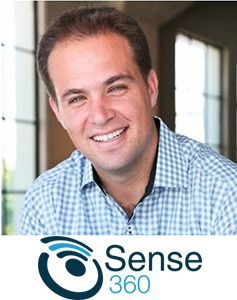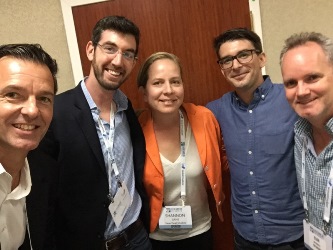This month's newsletter features highlights from the Siemer Summit in Beverly Hills, the SLUSH conference in Helsinki and conversations with the founders of emerging tech start-ups in sensor data technology and virtual reality.
MDM Supports the Start-up Community in LA; Siemer Summit Round up
The 5th annual Siemer Summit, MDM's biggest sponsored event, was held in Beverly Hills last month. During this invite-only event, over a thousand digital media and technology leaders gathered to network and to hear from 114 start-ups who are driving the innovation around us. Day one of the summit concluded with the 2015 Wavemaker Awards, which featured 11 awards across industry and overall achievement categories.
The grand prize and the Big Kahuna Award was awarded to the single, most innovative, most disruptive and most-likely-to-succeed company and included a $50,000 commitment from MDM (a $25,000 convertible note and $25,000 of business advisory and legal services). This year, the grand prize winner—and our new client—is Sense360, a sensor intelligence start-up. We welcome Sense360 to the family and congratulate this year's award winners and nominees! Here is the full list of winners:
- The Big Kahuna Award—Sense360
- Wavemaker Award (Most Disruptive Company)—The Honest Co.
- Waverider Award (IPO of the Year)—MindBody
- Mahalo Award (Community Builder)—IdeaLab
- Cowabunga Award (SaaS)—Yoi
- Switch Foot Award (Music)—Dysonics
- Impact Zone Award (Data and Analytics)—Sense360
- Sand Dollar Award (eCommerce and mCommerce)—Parachute
- Hang Ten Award (Ad Tech)—Vertical Mass
- Party Wave Award (Social Media and Content)—Fanbread
- Point Break Award (Video Technology)—FEM Inc.
back to top
Exclusive Q&A with Sense360 CEO Eli Portnoy
Sense360, a sensor intelligence start-up that launched in October 2014, empowers app developers to create more personalized and relevant experiences for consumers based on the vast amount of data (mostly untapped) generated by smartphones and other smart devices. In the latest of our Q&A series, Sense360 CEO Eli Portnoy shares his insights into sensor technologies and their applications in everyday life.

1) What is the reason your company exists (and what problem(s) are you looking to solve)?
We believe that sensors represent the most untapped opportunity on mobile. Our phones have over 10 sensors built into them that are incredibly powerful and able to constantly gather data about where we are, what we are doing, and what is happening around us. Our apps should be able to use this data to be much, much smarter, anticipating and predicting what we need at all times. Imagine a world where you land in an airport and an Uber is automatically summoned to meet you at the gate, or you walk into a gym and get on a bike and your workout playlist starts playing, or you are finishing up a business lunch and Expensify reminds you to log your meal. The hardware to power these examples is available today on your phones, but the software to enable developers to actually build these experiences is missing. That's what Sense360 solves. We handle all of the complexity around getting the sensor data, translating it, optimizing battery, and managing privacy and let developers code against real-world events rather than raw sensor data.
2) Why will you succeed (and what is your single most important ingredient for success)?
Sense360 is a highly complex technology that needs to do a lot of very powerful things, but the key to our success is hiding that complexity and making it easy to build on top of our platform. I think we have done a good job of building a developer tool that is easy, intuitive, and fun to build with, which ultimately will lead to more developer adoption, more apps with our technology, and more users on our platform. This is our flywheel, because the more data we process, the more accurate our detection algorithms get and the better and more defensible our service becomes.
3) What do you enjoy most outside of building your business?
Spending time at the beach with my three kids and wife and nothing even comes close. Although if I had to pick a second it would probably be going to a Clipper game.
4) What digital media trend is most interesting to you (and what is the least)?
I am a bit biased, but I think the ability to measure the offline world the way we do the online world is massively transformational. There are so many questions we've never had answers to that we will over the next few years. How far do people drive to get to McDonald's vs. Burger King? How often do people fill their car with gas? Do people leave for work later when it rains? These are all questions that we will have answers to in the next three years, and the answers will likely turn at least some conventional wisdom about how we advertise on its head.
back to top
VR to Reach Mass-Market Status in 2016: MDM's VR/AR Panel at the Siemer Summit

At this year's Siemer Summit, MDM's Peter Csathy moderated a VR/AR panel with industry experts (including senior execs from Jaunt, Rothenberg's River Accelerator/Studios, CryWorks, New Deal Studios, and VNTANA—all of whom are pictured here after the panel, except for Ashley Crowder of VNTANA).
Here are some of the headlines:
1) The panel was unanimous that several millions of premium VR headsets will be sold in 2016 (that means excluding Google Cardboard); premium headsets from Oculus, Samsung, Sony, HTC and others. That means that VR becomes a mass-market opportunity in the very near-term, i.e., next year.
2) Csathy cited research and consulting firm Digi-Capital's forecast of a total VR/AR market of $150 billion by 2020, the vast majority of which—80%—is predicted, perhaps surprisingly, to be AR. And the panel was unanimous—agreeing that the ultimate market potential for AR will dwarf the VR market, because AR's semi-immersive (rather than fully immersive) nature means that AR applications are much broader in scope.
3) But, interestingly, all agreed that VR is far ahead of AR in terms of obvious mass consumer and business applications right now—and, further, while many significant VR-focused companies are widely known, major AR market participants are less so. Magic Leap and Microsoft are leading the way, and virtually no others are widely known. In fact, the panel had difficulty identifying others.
It was a great panel, and we covered much ground.
back to top
Increasing Momentum in VR Content Distribution
The VR movement continues to gain momentum, particularly in the media and entertainment realm, as we approach the release of more premium headsets in the coming months. Recent months have been particularly exciting as a number of the major video and social platforms have either debuted new features or indicated expansion into the VR sphere. Facebook recently enabled 360-degree video viewing on its newsfeed. YouTube unveiled a new brand of videos called "VR Videos" and enabled Cardboard viewing for all existing YouTube content. Hulu plans to launch a VR app this month, while the Netflix VR app is already available on Samsung Gear VR. Apple released a 360-degree U2 music video on the VRSE app as part of a larger experiential partnership with the band. These developments have provided us with a captivating glimpse into what the future holds in relation to the distribution of virtual content.
However, the effort to stake a claim within this facet of the VR industry goes beyond what can be considered the "media heavyweights." Other early players in this space that have been instrumental at building inroads within the VR production community are Littlstar and VRIDEO, both of whom were recently interviewed by MDM.
Littlstar, a Disney Accelerator start-up from 2015, aims to be the destination for premium immersive content. We met Littlestar's CEO, Ben Nunez, a few weeks back at Disney Accelerator and asked him our "Five Questions" to get his perspective on the world he seeks to disrupt.
VRIDEO is also a virtual content distribution platform, with a suite of web, mobile, and VR products that allow consumers to experience immersive video across VR and non-VR devices. Company CEO Alex Rosenfeld has been a familiar face as of late (speaking with us first at VidCon and then again at the Kaleidoscope VR Film Festival). He recently provided MDM with some additional insight regarding his company and the industry as a whole.
back to top
MDM Supports the European Digital Media/Tech Community at SLUSH

SLUSH—which has emerged as one of Europe's leading tech/digital media conferences—took place earlier this month in Helsinki, Finland. MDM attended for its second year amidst the Helsinki November slush and was featured. CEO Peter Csathy moderated an MCN/MPN/OTT video panel that featured Urs Cete (of leading video-focused investor Bertelsmann Digital Media) and Christian Meinberger (who leads ProSieben-backed MCN Studio71 which recently merged with U.S.-based Collective Digital Studio). Csathy also hosted a "transformation of media" roundtable with seven entrepreneurs who signed up to learn more about how technology and mobile have forever changed the media and entertainment landscape.
Why attend SLUSH? To shake things up, that's why. Here in the U.S., we may have the November L.A. sunshine, but it's also important to get out of our U.S.-centric comfort zone and get a much-needed global perspective. There's much talent (and opportunity) amidst the entrepreneurs across the Pond. Yes, you know about Rovio and Supercell. But Finland is not just about gaming anymore. Massive tech innovation is abounding all around in that frozen tundra—where innovative minds buzz with their coffee 24/7 amidst the increasing darkness (and, well, slush) of the later months.
SLUSH's ambitious vision is to be the Davos for tech start-ups and investors. But SLUSH's definition of tech expanded this past year (as it should) to feature digital media as well in a big way. 15,000 attended (including nearly 1,000 investors representing over 150 venture capital funds and more than 100 senior M&A execs)—the majority of whom hail from Northern Europe for sure, but are increasingly global—with the next most significant attending delegations being from Russia, the UK, Germany, China, Japan and, increasingly, the U.S.
Why such an international flair? Just think about Helsinki, Finland's geography. The city sits at the perfect juncture where the East meets the West (or vice versa)—and with inclusive, worldly sensibilities as a result. It is a digital media/tech event definitely worth attending.
back to top